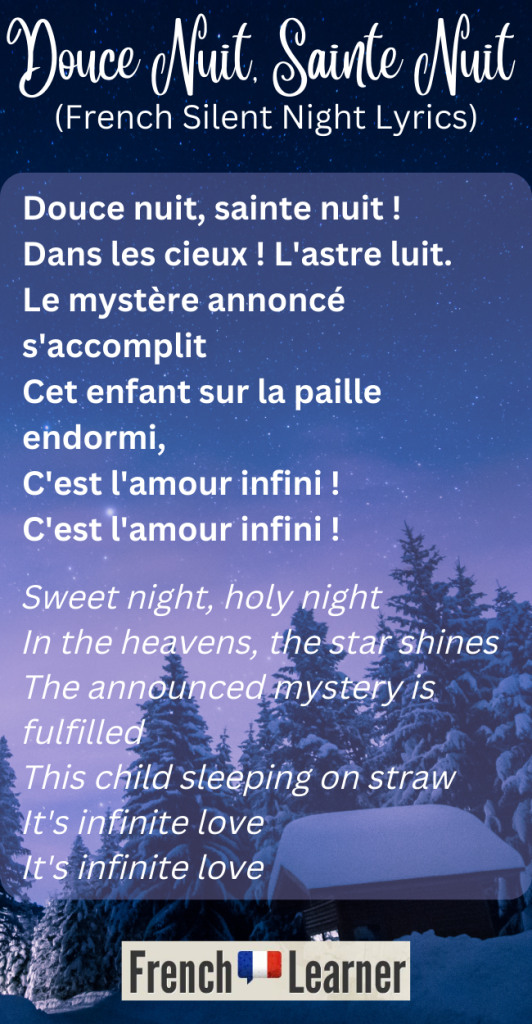Douce Nuit, Sainte Nuit (Meaning: Sweet Night, Holy Night; Pronunciation dus nɥi sɛ̃t nɥi ) is the French version of the English Christmas carol, Silent Night. The original version of Silent Night was written in German and dates back to the early 1800s in Austria. The French version was made famous by the legendary Tino Rossi. This post provides line-by-line explanations of the lyrics’ vocabulary and grammar.

Listen to Douce Nuit – Sainte Nuit (Silent Night in French)
This YouTube video for Douce Nuit, Sainte Nuit has over four million views.
You can also listen to Tino Rossi’s recording of Douce Nuit, Sainte Nuit on Spotify.
Lyrics analysis
The French lyrics of Douce Nuit (Silent Night) recount the birth and arrival Jesus on His birth on Christmas. In this section we’ve selected lines from the song which we feel offer interesting insights into learning French vocabulary and grammar.
Douce nuit, sainte nuit !
We translated to this line to “Sweet night, holy night”. The adjective doux (douce in the feminine) form can translate to soft, gentle, pleasant and sweet. Saint as an adjective translates to holy.
Dans les cieux ! L’astre luit
This line translates to “In the heavens, the star shines”. Cieux is the plural of ciel, which means star. Astre is a synonym for étoile, which means start. Luit comes from the verb luire, which means to shine.
Le mystère annoncé s’accomplit
This line translates to “The announced mystery is fulfilled”. S’accomplir translates literally to “is accomplished” and is an example of a passive reflexive verb.
Saint enfant, doux agneau !
This line translates to “Holy child, soft lamb”. Agneau means lamb in French. This page on our site offers a complete list of French animal vocabulary.
Qu’il est grand ! Qu’il est beau !
This line translates to “How big he is, how beautiful he is”. The literal translation of “Qu’il est grand” is “That he is big”.
Des bergers conduisant leurs troupeaux
This line translates to “Shepherds driving their flocks”. Troupe in French has several translation including troop, herd and flock.
Vers son humble berceau ! / C’est vers nous qu’il accourt
These two lines translate to “Towards his humble cradle, He comes running towards us”. Both lines uses the preposition vers, which translates to towards or around. The verb accourir means to come running or to hurry towards.
En un don sans retour !
This line was difficult to translate. Our translation was “In a gift without return”. Don in French translates to gift or donation.
Qu’il soit Roi pour toujours !
This line translates to “May he be the King forever”. “Qu’il soit“ translates directly to “that he be”. This line makes use of the French subjunctive mood, an advanced tense that’s used to express wish, emotion and doubt.
Quel accueil pour un Roi !
This line translates to “What a welcome for a King”. Acceuil translates to “welcome” as well as “reception” in a hotel lobby. Quel + noun means “What a + noun”. This page covering ways to say what in French explains how to use “quel”.
Point d’abri, point de toit !
This line translates to “The spot of the shelter, the spot of the roof”. Point can translate to both spot and point.
Dans sa crèche il grelotte de froid
This line translates to “In his manger he shivers from cold”. The verb grelotter means to shiver. Froid is both a noun and adjective for cold. This page explores French weather vocabulary.
O pécheur, sans attendre la croix
This line translates to “Oh sinner, without waiting for the cross”. The verb attendre is a regular -re verb and translations including “to wait” and “to expect”.
Gloire au sein maternel
This line translates to “Glory to the maternal heart”. Sein means breast, but a figurative meaning is “heart” or “center”.
Qui pour nous, en ce jour de Noël
This line translates to “Who for us, on this Christmas day”. Qui translates to who in French.
Enfanta le Sauveur éternel
This line translates to “Gave birth to the eternal Savior”. Enfanter is a literary verb for “to give birth”. Enfana means “gave birth” and is enfanter conjugated in the passé simple, a literary past tense.
Qu’attendait Israël !
This line translates to “That Israel was waiting for”. This page on our site offers an extensive list of country names.

Douce Nuit French Lyrics & English subtitles
Douce nuit, sainte nuit !
Dans les cieux ! L’astre luit.
Le mystère annoncé s’accomplit
Cet enfant sur la paille endormi,
C’est l’amour infini !
C’est l’amour infini !
Sweet night, holy night
In the heavens, the star shines
The announced mystery is fulfilled
This child sleeping on straw
It’s infinite love
It’s infinite love
Saint enfant, doux agneau !
Qu’il est grand ! Qu’il est beau !
Entendez résonner les pipeaux
Des bergers conduisant leurs troupeaux
Vers son humble berceau !
Vers son humble berceau !
Holy child, soft lamb
How big He is, how beautiful He is
Listen to the pipe sounding
Shepherds driving their flocks
Towards his humble cradle
Towards his humble cradle
C’est vers nous qu’il accourt,
En un don sans retour !
De ce monde ignorant de l’amour,
Où commence aujourd’hui son séjour,
Qu’il soit Roi pour toujours !
Qu’il soit Roi pour toujours !
He comes running towards us
In a gift without return
In this world ignorant of love
Where he’s starting his stay
May he be the King forever
May he be the King forever
Quel accueil pour un Roi !
Point d’abri, point de toit !
Dans sa crèche il grelotte de froid
O pécheur, sans attendre la croix,
Jésus souffre pour toi !
Jésus souffre pour toi !
What a welcome for a King
The spot of the shelter, the spot of the roof
In his manger he shivers from cold
Oh sinner, without waiting for the cross
Jesus suffers for you
Jesus suffers for you
Paix à tous ! Gloire au ciel !
Gloire au sein maternel,
Qui pour nous, en ce jour de Noël,
Enfanta le Sauveur éternel,
Qu’attendait Israël !
Qu’attendait Israël !
Peace to all, Glory to heaven
Glory to the maternal heart
Who for us, on this Christmas day,
Gave birth to the eternal Savior
That Israel was waiting for
That Israel was waiting for
More on our site:
- Top 10 French Christmas songs
- Most popular French songs of all time
- Vive le vent (Jingle Bells) lyrics
- Minuit Chrétien (O Holy Night) lyrics
- How to say Merry Christmas in French
- French Christmas traditions
- French Christmas vocabulary
- French Hanukkah vocabulary
French wiki page:


